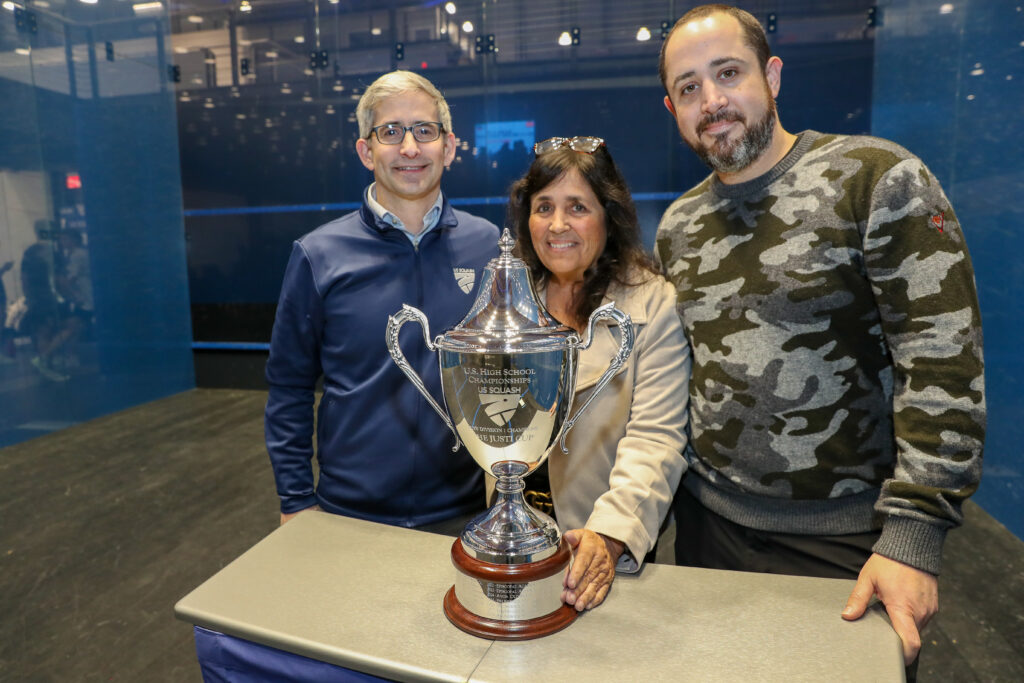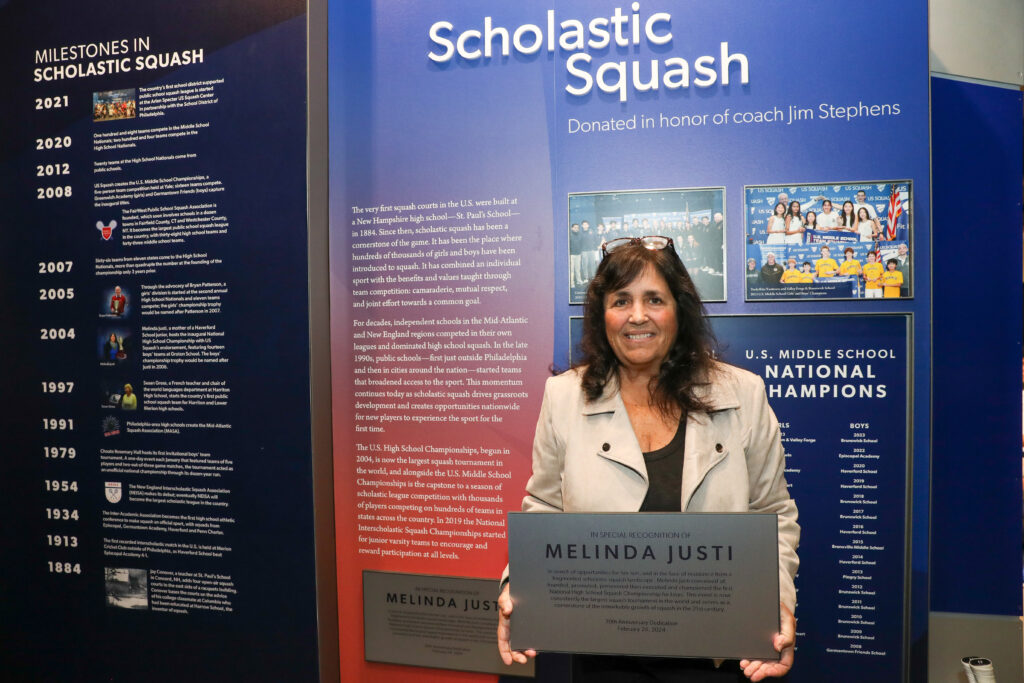
US Squash marked the twenty year anniversary of the U.S. High School National Championships for boys by honoring Melinda Justi, the founder of the event. A special permanent plaque commemorating Justi’s contributions to the sport was unveiled as a part of the Scholastic Squash exhibit at the Arlen Specter US Squash Center. A new permanent trophy for the Justi Cup for the Division 1 boys’ national championship was also presented.
Generously donated by the Justi family, the new trophy will serve as the pinnacle of the boys High School Nationals Division 1 in perpetuity. US Squash recognized Melinda and Parker Justi ahead of the 2024 High School Nationals semifinals Saturday, February 24, at the Arlen Specter US Squash Center.
The growth of squash in the United States over the past two decades is inextricably linked with the growth of the U.S. High School Squash Championships.
Twenty years ago, US Squash had a staff of four, there were no national championships, there were only two public school teams in the country, and the vast majority of juniors played in individual tournaments, not on teams.
Frustrated that her son, Parker, didn’t have an opportunity to play in a season-ending championship, or a way for his team, Haverford, to see how they stacked up against other teams in other leagues, she set out to make that possible, and wouldn’t take no for an answer. And she got plenty of “no’s” from Coaches who were content with their leagues and league championships. One all-important “yes” came from then US Squash President Palmer Page, who empowered Justi’s pursuit of organizing a national championship.
Justi took it from there. The inaugural boys High School Nationals fielded fifteen teams at The Groton School in Massachusetts. Traveling through a snow storm from Philadelphia to Groton, the Justi’s organized everything from draws to snacks, supplies and shirts.
The High School Nationals has since grown year on year from fifteen teams to the world’s largest squash tournament with more than 1,600 players. In 2018, the tournament peaked with 206 teams–including both varsity and junior varsity teams–which necessitated the creation of the National Interscholastic championships in 2019 for junior varsity and hybrid scholastic programs. The 2024 High School Nationals set a new record of 203 varsity programs–including more than fifty public schools–competing across seven boys divisions and six girls divisions.
“Melinda’s entrepreneurial spirit, her willingness to roll up her sleeves, to not take no for an answer, her pure energy, and positivity has left an indelible print on squash in the U.S.,” said Kevin Klipstein, US Squash President & CEO. “For more than a dozen years I have had the first High School Nationals draw framed in my office as an inspiration. Given what we see happening, with the growth of the public school league here, and squash being adopted at schools in Houston and Los Angeles, we see a very bright future for high school squash – thank you Melinda.”
“I would like to recognize Dave Talbott, who isn’t with us any more,” Justi said. “Dave was the Yale coach and was an inspiration. He told me we could host the tournament at Yale if we got it started and we did exactly that. For years he hosted the tournament at Yale and was a big part in allowing the tournament to grow like it was able to grow. I’m just thrilled to see how big the tournament has gotten and how wonderful it is for all of you kids to be able to play.”
One year after the inaugural boys tournament, Bryan Patterson ensured the foundation of a girls division in 2005. US Squash will celebrate the twentieth anniversary of the inaugural Patterson Cup at the 2025 High School Nationals.
The new Scholastic Squash exhibit plaque reads reads:
“In search of opportunities for her son, and in the face of resistance from a fragmented scholastic squash landscape, Melinda Justi conceived of, founded, promoted, persevered then executed and championed the first National High School Championship for boys. This event is now consistently the largest squash tournament in the world and serves as a cornerstone of the remarkable growth of squash in the 21st century.”













